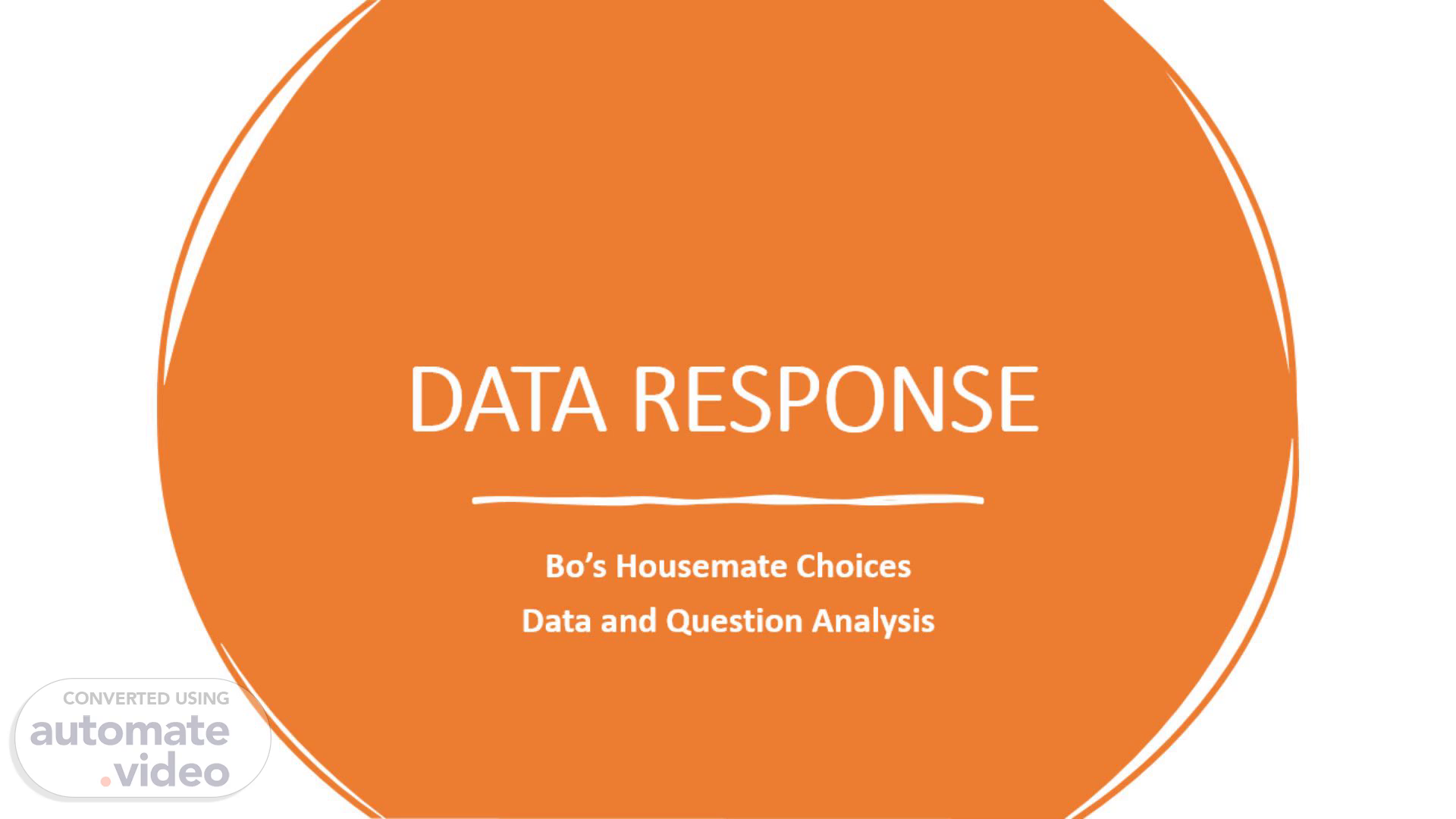Scene 1 (0s)
[Virtual Presenter] "Good day, everyone! Today, we are going to dive into an engaging activity where we'll help Bo choose a suitable housemate. We’ll be looking at some data, analysing three candidates, and answering some key questions based on what we find. Before we begin, who here has ever had to share a room or house with someone? [Pause for responses]. Great! Now, you probably know that choosing the right person to live with is important for everyone to be comfortable, right? Let’s see how we can help Bo make that choice.".
Scene 2 (31s)
[Audio] "First, let's start by understanding what the data is all about. We have three characters—Darin, Edvard, and Kwame. Each has different preferences, lifestyles, and needs. The scenario is that Bo is searching for a housemate, and we need to help him decide which of these candidates will be the best fit. Can anyone guess what factors might be important when choosing a housemate? [Pause for responses]. Yes, things like cleanliness, schedules, and personal habits can be deal-breakers!".
Scene 3 (1m 0s)
[Audio] "Now, let's look at the questions we'll be addressing today. First, we'll need to think about why each candidate might not find Bo's house suitable. Then, we'll analyse the advantages and one disadvantage for each candidate, and finally, decide who Bo would be most likely to choose as a housemate. Who can tell me why it's just as important to consider the negatives when choosing a housemate, and not just the positives? [Pause for responses]. Exactly! Living with someone involves compromise, and if there are deal-breakers, it can create tension.".
Scene 4 (1m 32s)
[Audio] "Now, let's put ourselves in the shoes of the candidates. Each one has their own personality and lifestyle, so we need to figure out why Bo's house might not be suitable for them. Let's start with Darin. Based on the data we have, why do you think Bo's house might not work for Darin? [Pause for responses]. Good points! Remember, you need to answer this in about 40 words, so keep your response clear and focused.".
Scene 5 (1m 55s)
[Audio] "Let's go over each candidate briefly, starting with Darin. Who can tell me what Darin might not like about Bo's house? [Pause for responses]. Excellent! Now, think about how Darin's needs might conflict with Bo's living situation. Now, what about Edvard? How might his lifestyle clash with Bo's setup? [Pause for responses]. Great thinking! Edvard's situation is quite different from Darin's. And finally, Kwame. What challenges might Kwame face if he moved into Bo's house? [Pause for responses]. You're spot on! Each candidate has different preferences, and we need to highlight those.".
Scene 6 (2m 34s)
[Audio] "Now that we've looked at the reasons why Bo's house might not work for each candidate, let's move on to selecting the most suitable one. We're going to focus on one candidate and look at the pros and cons. Who thinks Darin might be the best fit for Bo? [Pause for hands]. Alright, how about Edvard? [Pause for hands]. And Kwame? [Pause for hands]. When answering, remember, you can't compare candidates. Focus only on the one you think is the best choice, explain their advantages, and also mention one disadvantage. Can anyone share an example of how you would frame that answer? [Pause for responses]. Good! Make sure your answer is written in continuous prose, so it reads as a structured explanation.".
Scene 7 (3m 16s)
[Audio] "Now, it's time for some teamwork! I'd like you to group up and read each other's answers for the last question. Focus on question (c), where you had to choose the most suitable candidate. Once you've read the answers, discuss which one you think is the strongest and why. Then, copy that answer onto the table assigned to your team. Does everyone understand the task? [Pause for any questions]." [Allow time for students to discuss.] "Alright, which group thinks they have a strong answer? [Pause for responses]. Excellent! What made this answer stand out for you? [Encourage groups to explain their reasoning].".
Scene 8 (3m 53s)
[Audio] "Finally, let's go over the criteria for a good answer. To get full marks, your response should: Address the question fully, with both a point and its development. Be properly structured and make sense in terms of logic. Organise your ideas clearly by themes where applicable. Be grammatically accurate—no simple errors, and avoid repeating ideas. Now, let's see, who can give me an example of an organised answer? [Pause for a volunteer]. Great! And why is it important to avoid repetition? [Pause for responses]. Exactly! Repetition shows a lack of depth in your response.".
Scene 9 (4m 34s)
[Audio] "Great job, everyone! By analysing the candidates thoroughly, you've practised critical thinking and reasoning, key skills you'll use both in your studies and beyond. Remember, choosing the right person to live with is more than just finding someone you get along with—it's about making sure everyone's needs are met. Thank you, and well done!".
